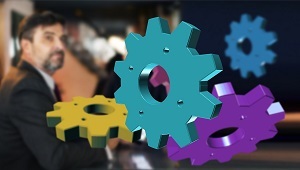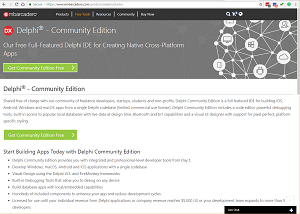What Will Be The Next Tech?
a year ago
Author: Luke Gehl
![]()
 Centralized
Centralized
Many consider the first electronic computer to be the Z1, invented by German Konrad Zuse in 1936 and 1937. The Z1 could perform Boolean logic and binary floating-point numbers. Its biggest problem was that it was unreliable, as you would expect from something that is part mechanical. One of its shortcomings was that it was an electromechanical computer. Moving parts means things can wear out. Zuse went on to create the Z3 in 1941, which was considered to be the first programmable computer, albeit it, like the Z1, was electromechanical.
The first purely electronic computer was ENIAC (Electronic Numerical Integrator And Computer). It was created at the U.S. Army's' Ballistic Research Laboratory in 1945 by J. Presper Eckert and John V. MAcuhly from the University of Pennsylvania. t was used to calculate trajectories for missiles. Like the Z1, its input was through relays by flipping switches. This made "loading" a program take far longer than was feasible.
Read more
The Automation War
a year ago
Author: Luke Gehl
 Who, What, Now?
Who, What, Now?
If you aren't aware of it, there's a holy war of sorts going on between some of the most popular automation tools. Much in the same way,there has been a holy war going on between Unix and Windows since the inception of Windows in 1985. (There was a war of sorts in the Unix arena that started in the 1990s between Linux and everyone else. We can all pretty much agree that Linux won that war.) That war is between the automation tools Ansible, Chef, Puppet, and Salt. Are there other tools for automation out there? Sure, such as Perl or Python. While Python is making headway against Java in becoming one of the most popular languages to use to develop software, it is still far behind the aforementioned tools for automation.
Read more
The Beginning Of The End?
a year ago
Author: Luke Gehl
 Big Tech
Big Tech
If you're into Unix and have been following the newsfeeds over the last decade, it's likely that you've heard that the big technology companies have been slowly but surely giving up on their own offerings of Unix and leaning towards Linux. According to a 2018 report from Gartner written by Matthew Cheung, AIX and HP-UX were both declining in market share in 2017. In an article in Network World by Andy Patrizio in September of 2017, Oracle released a couple thousand of its Solaris and Sparc engineers. That tells the rest of the world that Oracle has no plans to continue the expansion of Solaris in the enterprise. Other Unix variants such as Tru64 and Ultrix by DEC were discontinued years ago. Xinuos' offerings (formerly owned by SCO) of OpenServer and UnixWare may be still hanging on but they haven't had any updates in several years. Irix has been gone for what seems to be forever.
Read more
Embarcadero Delphi Community Edition!
a year ago
Author: Luke Gehl

What Is Delphi?
I've been programming for a long time. My first introduction to programming was BASIC and Pascal in high school. From there I went on to college to receive a degree with a major in Computer Science. It was in college where I was introduced to a couple of Borland products: Turbo Pascal and Turbo C that ran under MS-DOS. They are compilers sold by Borland. Both products were owned by the Computer Science department and people would use them for special projects. I wrote some software in both, in fact on of the projects was for the Physics department. Later in graduate school, I purchased Borland Pascal and wrote some software in it. It was the big brother of Turbo Pascal. It had a small GUI that helped me develop some small Windows-based programs. Not long after, Delphi came and I was hooked!
Read more
Mother Of All Demos
a year ago
Author: Luke Gehl

Where To Start
I would be pretty confident in claiming that you have never heard of a man named Douglas Engelbart. Before you Google his name, let me share with you what you will find. Engelbart received his B.S. degree from Oregon State College in 1948. From there there he went on to obtain his M.S. in 1953 and Ph.D. in 1955 from Berkeley. All of those were in electrical engineering. Between his undergraduate degree and graduate degrees, he found himself engaged and soon to be married, but hadn't settled on a career yet. He found he didn't have any real goals in life other than marriage and some kind of a job. So he sat down and over the span of some months, he came to conclude several points on his future.
Read more
Which Linux Distro For My Desktop?
a year ago
Author: Luke Gehl

Linux! Linux! Linux!
Based on some research that just about anyone can do on the Internet, there is any number of ways to determine what the best distribution should be for your desktop. But of course, you shouldn't believe all the hype. After all, it's a nice shiny colored brochure you're holding when you buy that new car. Why should going with a desktop Linux distribution be any different? That being said, you can trust places such as TechRadar or DistroWatch to report their experience. Should we then not trust places that report the actual popularity of these desktops based on downloads? If you believe that something more popular is because it has better marketing with a larger advertising budget, then you likely don't know Linux. The Linux community is a fickle bunch. We don't just go for the latest shiny this-or-that. We go for distributions that do exactly what we want how we want.
Read more
Which Virtual Desktop To Use?
a year ago
Author: Luke Gehl

The Products
There are really two competing products out there for doing virtualization on a desktop level. VMware Workstation and VirtualBox. Both have their cons and pros (which we'll get into a little lower). But the biggest thing is that VMware Workstation is a commercial product whereas VirtualBox is 100% free!
Some Basic Requirements
For each of these pieces of software, there are some basic requirements. in order to run a virtual machine, you'll need at least the following:
Read more
 Centralized
Centralized Who, What, Now?
Who, What, Now? Big Tech
Big Tech


